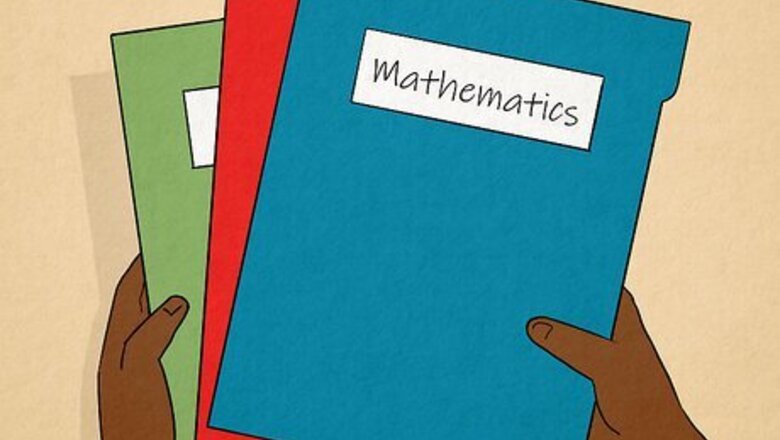
views
Organize your assignments in folders or notebooks.
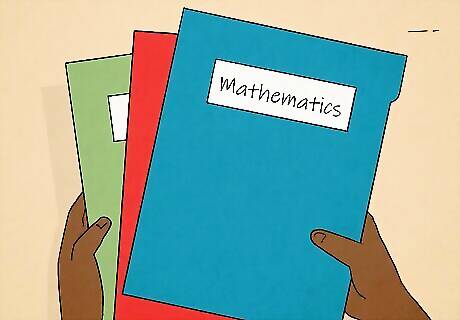
Sort your assignments by subject or class. Use different notebooks or folders for each class or subject, and store all homework and notes within their subject. If you have a big binder, separate the subjects with tab dividers. This will make it a lot easier to keep up with assignments. If you have a habit of just stuffing papers in your bag, take the time to clean it out each day to put things where they belong and to get rid of things you no longer need. Figure out the organization method that works for you—you might want to have a section in your binder for graded papers and one for assignments that are ready to turn in, for instance. If you have a lot of online assignments, create folders for them on your computer, then add sub-folders within each for things like notes, homework, research papers, and handouts. If you have ADHD: Color-coding your folders and notebooks may help you remember what goes where. For example, use blue notebooks for math and red for English.
Track all of your assignments in a planner.
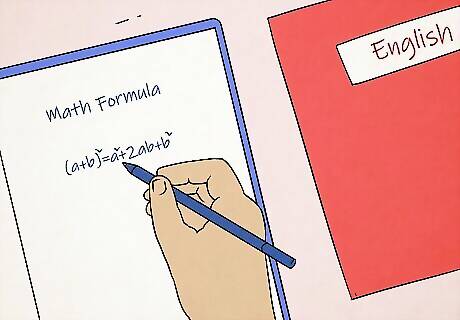
Use a physical or digital planner to keep up with assignments. Write down due dates for homework, test dates, and other important information as soon as you learn about them. Include daily to-do lists, including any sports or club meetings, so you know what you need to do each day. If you use a digital planner, like Google Calendar or Notion, turn on notifications so you receive alerts when something is due. Check your planner daily to ensure you don’t miss any assignments. Consider whether you’re more likely to check a paper or digital planner. For example, if you have a paper planner but forget to look at it most days, you might do better with an app on your phone. If you have ADHD: Even if you have a physical planner, set reminders on your phone so the information becomes visible again. Pritchard sees value in both paper and digital planners: “Having a paper planner and being able to write [things] down and visually see everything [is] one good way to keep organized because you can write all your due dates [and] little reminders. But the same goes for your phone calendar, for your iPhone—you can set reminders and due dates for different things.”
Keep your school supplies in one place.
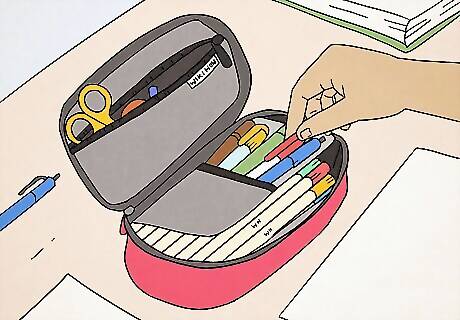
Store your supplies in your backpack, locker, or a storage bin. Store all your school supplies, like notebooks and pencils, in a designated place so you always know where they are. For example, keep your pens, pencils, and highlighters in a pencil case that stays in your backpack, and store extra papers and notebooks in a desk drawer at home. This way, you know what you have and if you need to restock anything. There is no “right” or “wrong” way to organize your supplies—the important thing is that you consistently put your things in the same place so you'll always know where they are. Even if you want to rush out of class when the bell rings, it will be a lot easier to find your stuff later if you take a few seconds to put everything away neatly. If you have ADHD: Consider having two sets of the supplies you need—one for school and one for home. This way, there are less things you have to remember to take back and forth from school.
Take organized notes.
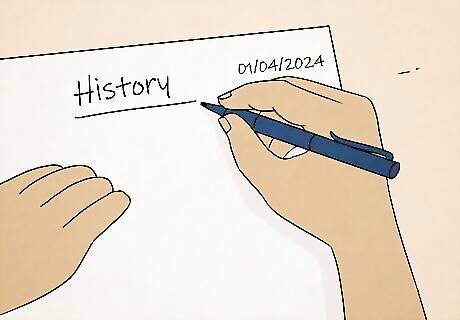
Write your notes in a way that makes sense to you. Remember, your notes will only be useful if you can understand them later. Each day, take notes on a fresh sheet of paper and write the date and the class at the top. This will help you keep track of specific lessons and information. Keep your notes simple by writing down keywords and short sentences. Don’t try to write down everything your teacher says—focus on the main concepts, preferably in your own words. Two popular note-taking methods include Cornell notes and mind mapping. Cornell notes are more structural, while mind mapping is more creative, so try out both to see which works better for you! Try using a highlighter to call attention to anything you think is especially important. Rewriting things in your own words may help you learn, understand, and memorize the material better!
Work in a distraction-free study space.
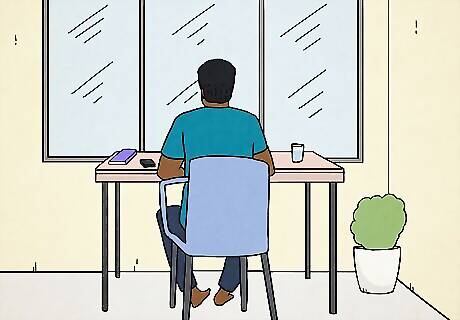
Choose somewhere quiet to do your homework. Have a designated homework space, like a desk in your room, so you can easily shift into study mode. Try to choose somewhere friends and family aren’t likely to interrupt you, and put away and turn off electronics. This will help you avoid distractions and prevent you from forgetting what you’re doing. Some people study best in complete silence, but other people do better with a little background music or white noise. Experiment to find what works for you. If you have ADHD: Try playing white noise in the background to help reduce distractions. When studying, Pritchard says, “Put your phone away; don't be scrolling on Instagram. I know even for myself, sometimes, it gets hard to [focus] if your phone's right there. It's hard to ignore it, so maybe [put] it in the other room.”
Find a study buddy.

Work with a friend to hold each other accountable. If you’re capable of focusing with other people around, consider studying with a friend in your class. This can make it easier to prepare for projects and exams as you can share ideas and ask each other questions. Consider forming a study group with a few other classmates, as well! Be sure to choose a friend who will actually study. If they just want to chit-chat, you’re unlikely to get any work done.
Create a study schedule and homework routine.

Do your homework at the same time each day. Having a routine will likely make it easier to remember to do your homework. Write down your general weekly schedule and choose blocks of time to study and do your school work. Stick to it, and after a few weeks, it’ll likely start to feel natural. Adjust your schedule as needed for any last minute changes or if you need to spend extra time on an important assignment. As you’re planning your schedule, think about when you tend to be most productive—are you full of energy right after school, or do you prefer to have a little downtime when you get home? Move things around until you figure out the best schedule for you. If you’re learning remotely, work on your difficult subjects during times of day you tend to work the best. Save your easier subjects for when you tend to drag a little more. Pritchard recommends that you “spend 20 minutes a night studying each subject. They say that chunking (which is like taking chunks of information) rather than sitting down for three hours and cramming before a test…actually helps you to remember the information and material better.”
Start assignments early.
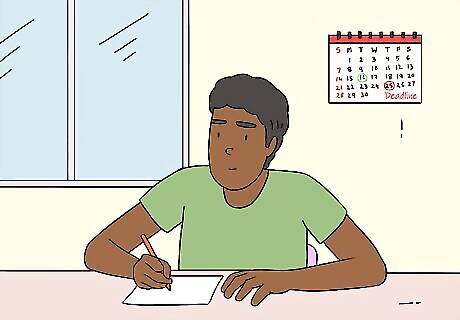
Don’t wait until the last minute to do your work. Even if you think you work better under pressure, procrastinating often causes more stress than it’s worth, and sometimes, you may forget about assignments altogether. Start assignments, especially big projects or important papers, as soon as possible. This gives you extra time to do your best work and ask for help if you need it. Plus, you won’t have to worry about cramming and pulling all-nighters. It may help to set your own deadlines a few days before the assignment is actually due. This can help reduce stress, as you won’t be working until the last minute and you’ll have extra time in case something takes longer than expected. If you have ADHD: Don’t be afraid to ask for accommodations, like having a written copy of all assignments and instructions that were otherwise given verbally.
Prioritize what needs to be done first.

Don’t try to multitask. Consider which assignments are due first and which make up a large percentage of your grade. Focus on completing these tasks first, then work on low-priority assignments when you finish. In general, it’s best to focus on one assignment at a time, as multitasking often causes students to take longer to finish assignments.
Break down big assignments into smaller tasks.
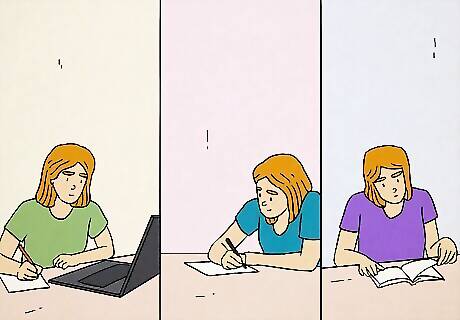
Work on large assignments a little at a time. Big, important assignments, like essays, can often feel overwhelming, so it can help to break them down into smaller, more manageable parts. This allows you to work on the assignment a little bit each day without feeling rushed. For example, if you have to write a 3-page paper in a week, schedule one day for doing research, one for making an outline, one for a first draft, and two days for revisions. That will still leave you a couple days of free time in case you fall behind or have other things you need to work on. Working a little bit each day will help the workload feel smaller and it will give you more time to relax at the end of the day.
Set rules for yourself.

Remember school comes first. While it’s important to socialize and make time for hobbies, as a student, school should usually be your priority. Avoid putting off assignments to hang out with friends. Setting rules and goals can help you stay focused and still have time for yourself. For example, tell yourself if you finish your reading assignment, you can go see a movie with your friends. Remember, there’s always time on the weekend for fun, so try to focus on school throughout the week. This doesn’t mean you should never take a break to do something fun. Taking breaks is healthy and helps prevent burnout. Just remember to be responsible and make sure you have time to finish your assignments without waiting till the last minute. While school should be a priority, your mental health comes first!
Take breaks.

Stretch your body and help your mind stay focused. When doing homework, remember to take a break now and then, like between assignments. Get up and walk around to stretch and clear your head. Grab a snack and take some deep breaths, especially if you’re feeling stressed. When you return, you’ll likely have a fresh outlook on the assignment and be able to focus better. While you can do whatever you want during your break, try to avoid things that may prevent you from returning your focus to your work. For example, if you get easily distracted by social media, don’t pick up your phone. Consider using the Pomodoro technique. Work for 25 minutes, take a 5 minute break, and repeat. After 4 work sessions, reward yourself with a longer 15-30 minute break. Pritchard recommends setting small goals when studying or doing homework. For example, she says, “Okay, I’m going to come home, I’m going to study for 20 minutes, and after 20 minutes, I will go get something to eat. Then I’ll come back for another 20 minutes, and after that, I will check Instagram.”
Get ready for school the night before.
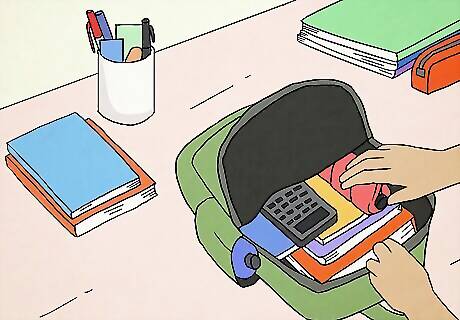
Prepare your backpack each night before school. Before you go to bed, check your planner and make sure you have all of the assignments and supplies you need for the next day. Put them in your backpack, and consider packing your lunch so you won’t be rushed in the morning. This will make you less likely to forget anything before school. You can even lay out your outfit for the next day! That way, all you'll have to worry about in the morning is getting up, brushing your teeth, and eating breakfast. If there's anything important you need to remember for the next day, try putting a sticky note somewhere you'll be sure to see it, like on your bathroom mirror, lunchbox, or door. Reader Poll: We asked 194 wikiHow readers and 54% of them agreed that the best time-saving tip to get out the door quickly is to have everything ready the night before. [Take Poll]











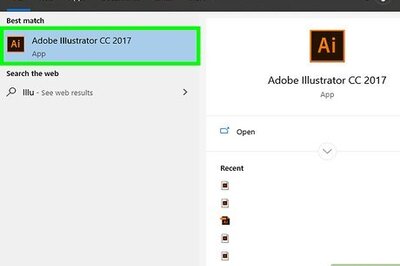
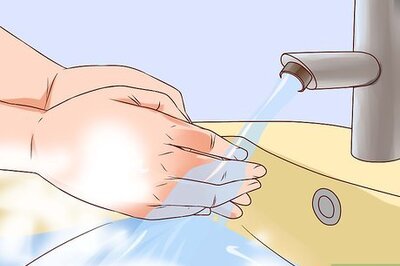





Comments
0 comment